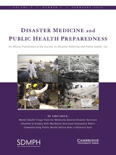
Disaster Medicine and Public Health Preparedness
Scope & Guideline
Transforming insights into action for public health safety.
Introduction
Aims and Scopes
- Disaster Preparedness and Response:
Research on the systems, frameworks, and strategies necessary for effective disaster preparedness and response, including training programs for healthcare professionals and communities. - Public Health Implications of Disasters:
Investigating the direct and indirect impacts of disasters on public health, including epidemiological studies assessing health outcomes following various calamities. - Mental Health and Psychosocial Support:
Exploring the psychological effects of disasters on individuals and communities, as well as effective methods for providing mental health support in emergency situations. - Health Equity and Vulnerability:
Analyzing how socioeconomic factors influence disaster preparedness and response, particularly for marginalized populations. - Interdisciplinary Collaboration:
Promoting and assessing the effectiveness of collaboration among various stakeholders, including healthcare providers, government agencies, and community organizations in disaster management. - Innovative Technologies in Disaster Management:
Evaluating the role of technology, such as artificial intelligence and telemedicine, in enhancing disaster preparedness and response capabilities.
Trending and Emerging
- COVID-19 Impact and Preparedness:
Research on the effects of the COVID-19 pandemic on healthcare systems, emergency preparedness, and community resilience has surged, addressing lessons learned and future implications. - Mental Health in Disasters:
An increasing focus on mental health outcomes related to disasters, including the psychosocial impacts and strategies for providing support during and after emergencies. - Climate Change and Health Risks:
Emerging studies are focusing on the intersection of climate change and public health, particularly how environmental changes exacerbate disaster risks and health outcomes. - Use of Technology in Disaster Response:
There is a growing trend in research exploring the integration of technology, such as AI and telemedicine, into disaster response and management strategies. - Community Engagement and Resilience Building:
Research emphasizing the role of community involvement and resilience-building strategies is gaining traction, highlighting the importance of local knowledge and resources in disaster preparedness.
Declining or Waning
- Traditional Disaster Management Frameworks:
There is a noticeable decrease in research focused solely on conventional disaster management frameworks, as the field increasingly embraces more dynamic and integrated approaches. - Single-Domain Studies:
Research that examines disasters from a single perspective or discipline is less frequent, with a shift towards more interdisciplinary and holistic approaches. - Post-Disaster Recovery Focus:
Studies concentrating primarily on post-disaster recovery, without addressing immediate response strategies or preparedness, appear to be less common in recent issues. - Geographic-Specific Disaster Studies:
Research that is limited to specific geographic regions without broader applicability or comparative analysis has decreased, as there is a growing trend towards global perspectives. - Static Policy Analysis:
The journal has moved away from static analyses of existing policies, favoring research that evaluates the effectiveness of adaptive and responsive policy frameworks.
Similar Journals
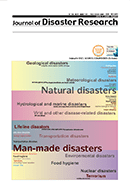
Journal of Disaster Research
Empowering communities with cutting-edge disaster management insights.Journal of Disaster Research, published by FUJI TECHNOLOGY PRESS LTD, is a prominent Open Access journal that has been disseminating critical research on disaster management since its inception in 2007. Focusing on the interrelated fields of engineering and safety, the journal aims to advance knowledge and policy in disaster risk reduction, response, and resilience, making it an essential resource for researchers, practitioners, and policymakers alike. With an ISSN of 1881-2473 and E-ISSN 1883-8030, the journal covers a wide range of topics related to disaster studies, ensuring the dissemination of innovative solutions and diverse perspectives. Situated in Japan, the journal has been ranked Q3 in both Engineering (Miscellaneous) and Safety, Risk, Reliability, and Quality categories, showcasing its commitment to quality scholarship. As it converges its research contributions from 2006 to 2024, the Journal of Disaster Research continues to serve as a vital platform for advancing the science and practice of disaster research, thereby enhancing societal resilience against crises.

Frontiers in Emergency Medicine
Pioneering insights for the future of emergency healthcare.Frontiers in Emergency Medicine, published by Tehran University of Medical Sciences, stands as an essential open-access platform dedicated to advancing research and practice in the diverse fields of emergency medicine, nursing, and medical services. With a focus on publishing high-quality studies that address the emerging challenges in prehospital and emergency care settings, this journal has rapidly gained recognition since its inception in 2021. The journal's current Scopus rankings place it favorably within the top quartiles for emergency medical services and emergency nursing, making it a valuable resource for researchers and practitioners aiming to enhance patient care and operational efficiency in emergency contexts. The journal encourages submissions that explore innovative practices, clinical outcomes, and policy developments in emergency medicine, promising accessibility and visibility for authors through its open-access model. Located in Iran, Frontiers in Emergency Medicine not only serves the regional community but also aspires to impact the global discourse in emergency healthcare.
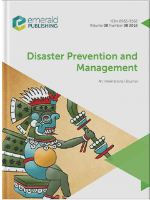
Disaster Prevention and Management
Leading the discourse on disaster resilience and recovery.Disaster Prevention and Management, published by Emerald Group Publishing Ltd, is a leading journal in the fields of disaster management, public health, and environmental policy. With an ISSN of 0965-3562 and an E-ISSN of 1758-6100, this journal has made significant contributions to both theoretical and practical advancements since its inception in 1992. Operating from the United Kingdom, it holds a Q2 ranking across various categories, including Business, Management and Accounting, Health (Social Science), and Public Health, reflecting its pivotal role in academic discourse and policy formulation. By engaging with contemporary issues related to disaster risk reduction, emergency preparedness, and resilience strategies, Disaster Prevention and Management aims to foster a multidisciplinary approach, making it a vital resource for researchers, practitioners, and students seeking to navigate the complexities of disaster scenarios effectively. With an impressive Scopus ranking across multiple categories, researchers are encouraged to explore its diverse range of articles and reports available for their academic and professional endeavors.

Australasian Emergency Care
Advancing Evidence-Based Practices in Emergency Care.Australasian Emergency Care, published by ELSEVIER SCI LTD, stands out as a premier journal in the field of Emergency Nursing, currently holding a prestigious Q1 ranking and positioned in the top 85th percentile according to Scopus metrics. With an E-ISSN of 2588-994X, this journal has been a vital platform for disseminating cutting-edge research since its inception in 2018. Focused on enhancing the practice, education, and research surrounding emergency nursing, Australasian Emergency Care serves as an essential resource for clinicians, educators, and researchers, offering access to a wide array of high-quality peer-reviewed articles. The importance of this journal lies in its commitment to improving patient outcomes through evidence-based practices and innovations in emergency care, making it a pivotal resource for anyone dedicated to advancing their knowledge and expertise in this critical field.
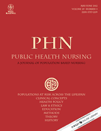
PUBLIC HEALTH NURSING
Elevating public health nursing to new heights of excellence.PUBLIC HEALTH NURSING is a premier journal published by Wiley, dedicated to advancing the field of public health nursing through the dissemination of high-quality research and innovative practices. With an ISSN of 0737-1209 and an E-ISSN of 1525-1446, this journal provides a vibrant platform for scholars and practitioners to share their insights from 1945 to the present day. The journal holds a strong presence in academia, ranked in Q1 within the Nursing (miscellaneous) category and Q2 in Public Health, Environmental, and Occupational Health for 2023, showcasing its commitment to impactful research. Currently positioned at rank #39 in General Nursing and #286 in Public Health according to Scopus, it serves as an essential resource for healthcare professionals, researchers, and students who are passionate about improving health outcomes and community well-being. Although it does not offer Open Access, PUBLIC HEALTH NURSING remains a significant contributor to the literature, promoting interdisciplinary collaboration and addressing critical public health challenges.
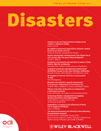
DISASTERS
Advancing interdisciplinary insights into disaster management.DISASTERS, published by WILEY, is a premier academic journal dedicated to advancing the understanding of disasters across multiple disciplines, including Earth and Planetary Sciences and Social Sciences. With a historical publication span from 1977 to 2024, this journal has established itself as a vital resource within the academic community, boasting a Q1 category ranking in both fields, indicating its high impact and relevance. DISASTERS ranks impressively in Scopus, holding the #27 position in General Social Sciences and #36 in General Earth and Planetary Sciences, reflecting its influence in shaping disaster research and policy. The journal serves as a platform for interdisciplinary collaboration, offering researchers, professionals, and students critical insights into disaster management, response strategies, and risk reduction measures. Although it is not an Open Access journal, DISASTERS remains a cornerstone for those looking to contribute to and stay informed about the evolving landscape of disaster studies.
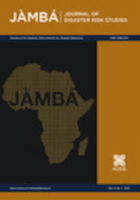
Jamba-Journal of Disaster Risk Studies
Transforming Insights into Actionable Strategies.Jamba-Journal of Disaster Risk Studies, published by AOSIS, serves as a vital resource in the fields of management, monitoring, policy, law, and safety research, with an ISSN of 1996-1421 and an E-ISSN of 2072-845X. Since its establishment as an Open Access journal in 2006, Jamba has dedicated itself to disseminating high-quality research that informs and enhances disaster risk management practices, particularly within the South African context and beyond. With a robust Impact Factor and acknowledgement in the Q2 and Q3 quartiles across critical categories in 2023, Jamba ranks favorably in Scopus, notably Rank #50/109 in Social Sciences (Safety Research) and Rank #218/399 in Environmental Science (Management, Monitoring, Policy and Law). The journal's convergence over the years—from 2013 to 2024—signals its commitment to adapting contemporary challenges in disaster risk studies. Scholars and practitioners are encouraged to explore Jamba as a go-to platform for innovative insights and collaborative discussions that impact policy-making and practical applications in disaster risk reduction.

Acute Medicine & Surgery
Enhancing clinical practice through open access to vital studies.Acute Medicine & Surgery is a notable peer-reviewed journal published by WILEY, focusing on the dynamic intersection of acute medicine and surgical practice. With an ISSN of 2052-8817, this open-access journal has been committed to disseminating high-quality research since its transition to open access in 2017. Aimed at an audience comprising researchers, clinicians, and students in the medical field, it facilitates broader access to innovative studies that enhance understanding and practice within acute care settings. The journal covers a wide range of topics, including emergency medicine, trauma care, critical analysis of surgical techniques, and best practices in clinical management. By providing a platform for cutting-edge research and case studies, Acute Medicine & Surgery plays a pivotal role in improving patient outcomes and advancing the field of acute healthcare.

Iranian Red Crescent Medical Journal
Exploring Pioneering Research in General MedicineThe Iranian Red Crescent Medical Journal, published by ZAMENSALAMATI PUBL CO, is a vital resource in the field of general medicine, offering a platform for researchers, professionals, and students seeking to disseminate and access significant medical findings. With an impressive Scopus ranking of #159 out of 862 in the General Medicine category, this journal represents the 81st percentile, underscoring its impact and relevance within the medical community. While its Scopus coverage is listed as discontinued since 2019, the journal continues to serve as an essential reference for innovative medical research and practices in Iran and beyond. Situated in Khorasan, Mashhad, this open-access publication encourages the sharing of knowledge while fostering advancements in medical science. Researchers and students will find it an indispensable tool for staying informed about critical developments and emerging trends in medicine.
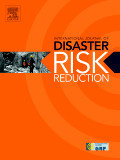
International Journal of Disaster Risk Reduction
Pioneering research to mitigate disaster impacts worldwide.The International Journal of Disaster Risk Reduction is a leading academic publication dedicated to advancing the understanding and management of disaster risks, promoting innovative solutions and effective strategies for risk reduction. Published by ELSEVIER, this journal serves as a critical platform for researchers, professionals, and students in the fields of Geology, Geotechnical Engineering, and Safety Research. With an impressive impact factor and ranked in the top quartile (Q1) across its various categories as of 2023, it demonstrates exceptional quality and relevance in its contributions to science and engineering disciplines. The journal has been committed to disseminating high-quality research since its inception in 2012 and remains open for new submissions through 2024. The Scopus rankings reflect its prestigious position, with notable placements in Earth and Planetary Sciences and Social Sciences, highlighting its influence in shaping best practices for disaster risk governance. As an essential resource for anyone involved in disaster preparedness and mitigation, the International Journal of Disaster Risk Reduction fosters knowledge exchange and collaboration among stakeholders in the global community.